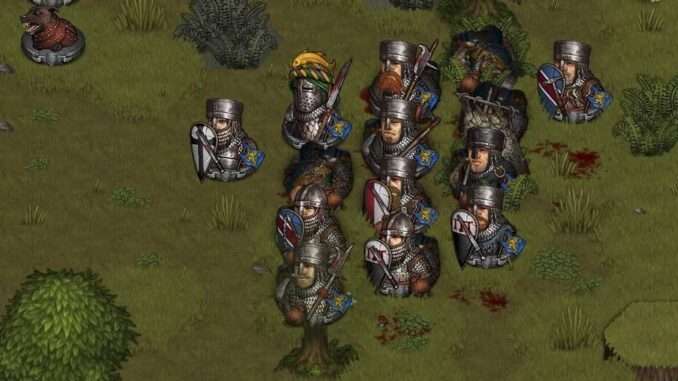
This guide is designed to help new players understand the line-based combat of this game, as well as set them on the right path towards developing their own strategies.
Beginners Combat Guide
Intro: Summary and Initial Tips
Welcome to a quick-start guide to the combat of Battle Brothers. This guide is written for new players just jumping into the game, who are confused about the combat.
While the strategic combat of Battle Brothers may be intimidating on paper, in practice it is far easier than you might expect. The three core tenants of this game is armor, line composition, and role assignment.
The Importance of Armor
Armor is by far the most important thing to put on your units in this game. Armor protects your units from being killed to a high degree, to the point where it is necessary to have against any opponent, even basic enemies! Good armor can make the difference between life and death.
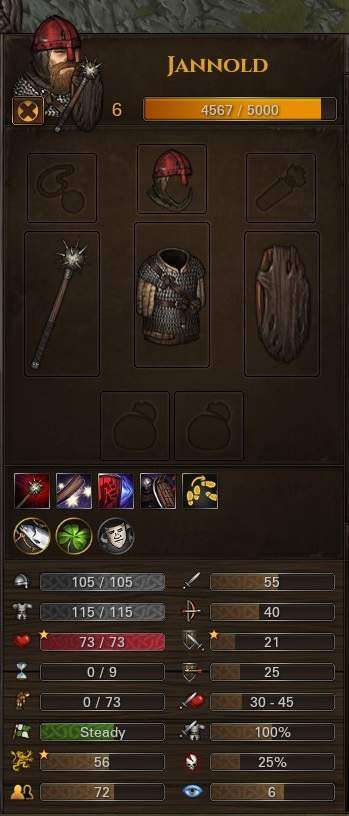
For example, here’s a strong unit from my own game, Jannold. This brother has a mere 75 hit points, which means a good hit from just about any two-handed weapon can instantly kill him. However, he is cloaked in thick armor that protects his head and body. Enemies will have to penetrate his armor before killing him.
If you want units to survive, they must have good armor on their heads and bodies! A shiny new sword might be cool, but a sturdy set of chain mail or plate will save their life. Better armor tends to double or even triple the effective health of your units. If your guys keep getting oneshot in the early game, its likely because you don’t have your hands on better equipment. Shields are similarly important, as they increase your melee and ranged defence by a considerable amount and grant Shield Wall, a powerful defensive buff.
The Importance of Line Composition
What ever you do, never separate your brothers! Unlike some other games, tactical positioning is of the utmost importance in Battle Brothers. Units who get cut off from their allies may get surrounded and killed, so try and keep your units beside at least one other ally. Never engage an enemy solo if you can’t help it!
Keeping all of your units in a straight line that slams against the enemy is called “line combat”. Making a strong line is imperative to success.
You should consider how you put your units together. Is it really a good idea to have ranged units firing through your line into enemies? Perhaps it is best if your ranged units switch to being melee units once your line meets the enemy line.
The Importance of Role Assignment
There are many ways to field a company, but putting random equipment on your men and calling it a day is a surefire way to get them killed. Instead, try assigning meaningful roles to your warriors and leading them into battle with strategy.
Tips for creating effective units will be covered in the next section.
Part 1: Unit Archetypes, aka “Skirmishers, Anti-Armor and Anti-Infantry”
A strong army in Battle Brothers has three kinds of units: Skirmishers, Anti-Armor and Anti-Infantry. Let’s go over each one briefly.
Skirmishers, aka your Tanks
Skirmishers are your walls. They stand shoulder to shoulder, weighing blows from incoming enemies. Good Skirmishers have the following:
- Decent armor. Not the heaviest to not exhaust your men, but good enough to take a few hits. Same with the helmet.
- A good shield, to help with blocking attacks completely, and a one-handed weapon. Swords, maces, and flails are good choices, but anything can work.
- High melee and ranged defence skills.
- High HP and Resolve, if possible.
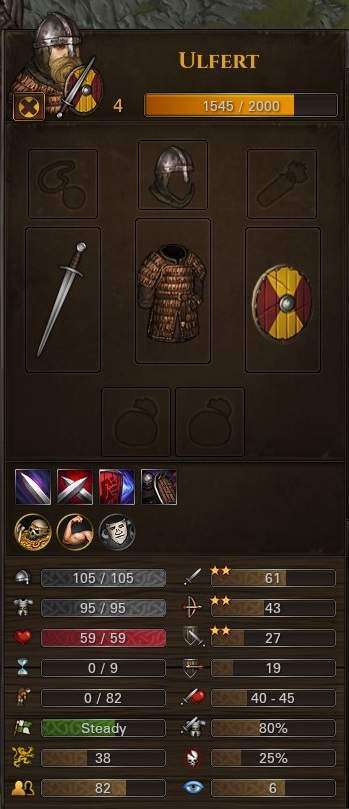
Here’s an example of a good mid-game to early lategame Skirmisher. Your job with these guys is to hold the line, fighting with enemies and weathering their blows. If can often be a good idea to equip your Skirmishers with bows to pepper enemies with arrows before they meet your shields.
Anti-Armor, aka your Supports
Anti-Armor units are designed to defeat your enemies Skirmishers. Their weapons are hefty, carrying blows straight through armor. Often, Anti-Armor units come equipped with weapons that either destroy shields or armor.
Good Anti-Armor units have the following:
- A two-handed weapon. Axes are good early for wrecking shields, while hammers and maces are good later or crunching armor. Two-handed swords can butcher enemies without armor.
- Heavy armor. Due to using two-handed weapons, the best armor should be given to these guys so they don’t beef it.
- High Melee Attack, HP, and Fatigue.
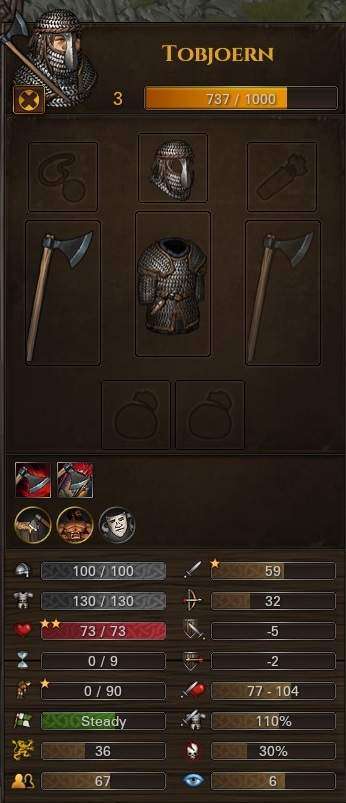
Here’s an example of a good mid-game to early lategame Anti-Armor unit. Note that this unit is still using an Axe, which is effective, but could be better off with another two-handed weapon of some kind. Your job with Anti-Armor units is to locate the tankiest enemy Skirmishers and blast them to pieces. Wreck their shields, break their armor, and leave them vulnerable, since two-handed weapons often have worse accuracy than one-handed weapons.
Anti-Infantry, aka your DPS
Anti-Infantry units are designed to make fights unfair. They have high range, high damage, and high accuracy. They can punch through enemy lines like a hot knife through butter and often team up with a Skirmisher to turn a 1v1 into a 2v1.
Good Anti-Armor units have the following:
- A good polearm, or 1-2 tile reach weapon. This allows Anti-Infantry units to strike over your Skirmishers, attacking your enemy!
- Medium armor, designed to give them maximum mobility and minimum fatigue gain. Fielding them without a helmet is suicide, however.
- High Melee Attack, HP, and Fatigue.
- Often good to have high Leadership or Resolve.
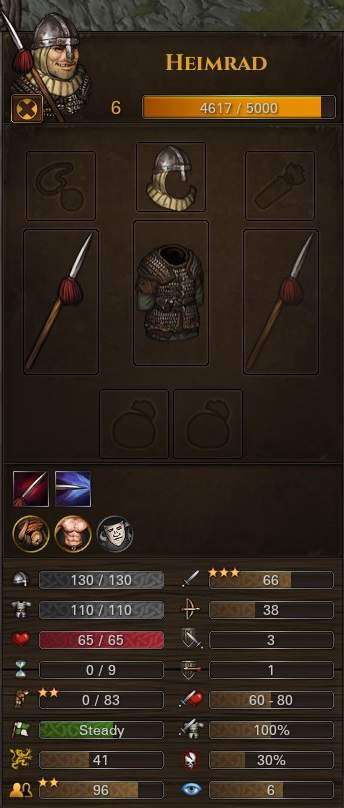
Here’s an example of a good mid-game to early lategame Anti-Infantry unit. With his high Fatigue and Melee Attack, this unit will snipe anyone trying to get into close combat with his Skirmisher. His ability to move around the battlefield and help target specific foes makes him great for turning the tide of battle.
While these are not all the possible unit types, these three work well together and can help make your line a real menace, even when outnumbered!
Part 2: Line Compositions and Morale
Good line composition is purely subjective and changes based on what resources you have access to. However, a good line looks something like this:
- Middle, Top and Bottom with a Skirmisher.
- Anti-Armor inbetween Skirmishers.
- Anti-Infantry behind Skirmishers and Anti-Armor.
- Standard Bearer alongside Anti-Infantry for when you have one.
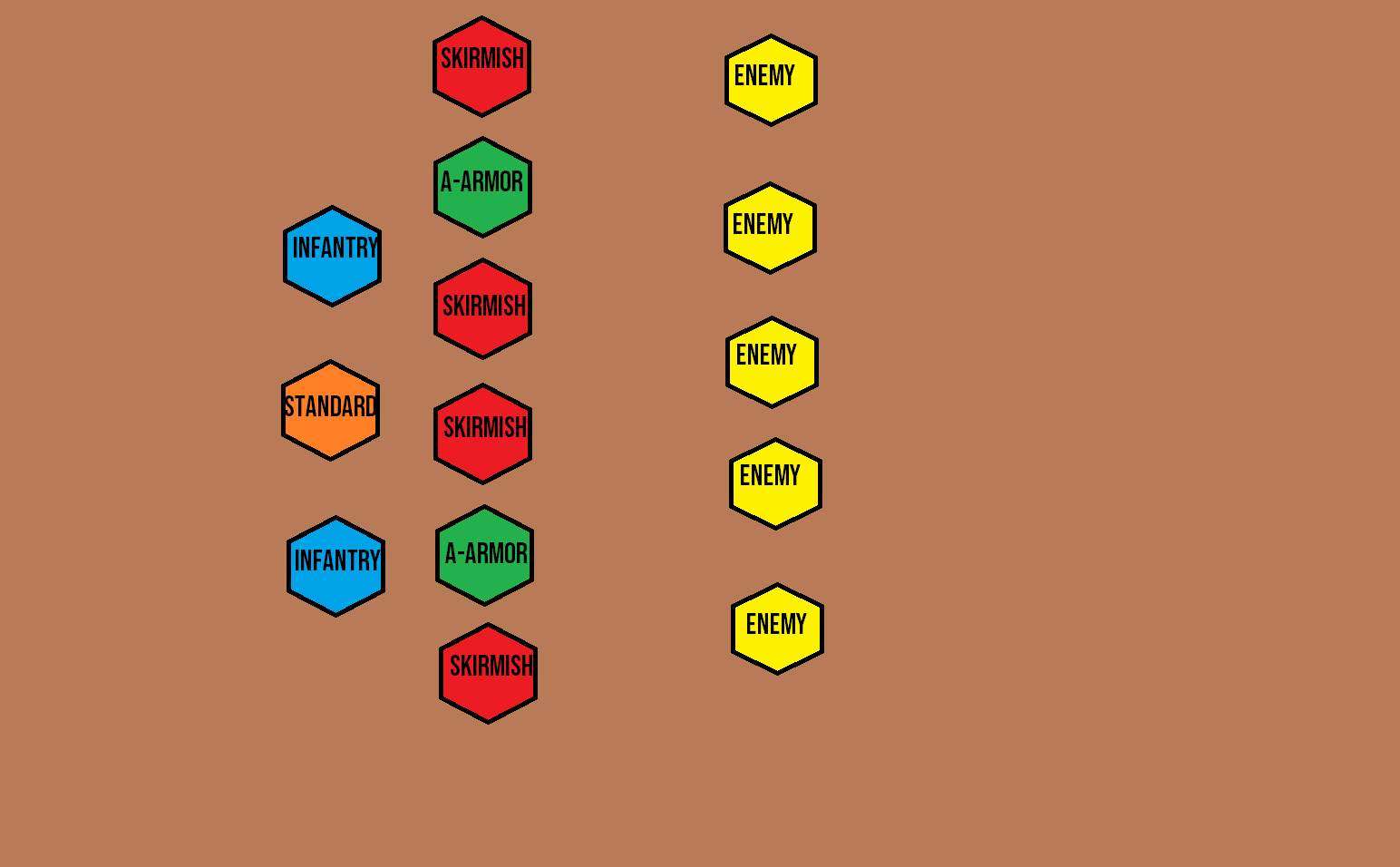
The reason this line works is simple. While your Skirmishers clip away at enemies and draw their attacks, your big boy Anti-Armor break down their shields and armor, weakening them. Your Anti-Infantry pick up the slack, killing units where they can and debilitating the enemy line. Your Standard Bearer assists, acting as support for your Resolve so your allies remain strong.
This is not the be-all-end-all line composition, but it is a great one to start with! Learning to field this line can make your early game strong and your lategame better. Note: Once the endgame rears its head, it might be better to have more Anti-Armor units than Skirmishers in your army, to better crunch through enemy armor. Adapt this strategy accordingly.
Managing Morale
Keeping your units alive is key to maintaining morale! Allied units who see their friends get butchered one by one will eventually flee the battle, so keep them healthy at all costs. If an ally is about to die, try and finish off their attacker as much as possible and disengage them from the fight.
Standards can dramatically help with morale. Keeping one in the party is nearly essential later in the game, as more powerful enemies are engaged with. It also doubles as a decent polearm, allowing the Standard Bearer to double as an Anti-Infantry unit. Getting one ASAP should be an important Ambition to fulfil.
Part 3: Further Reading
Recommended Perks
Perks can make your units a lot stronger than they normally are. Picking good ones can be great for keeping your brothers alive!
For Skirmishers:
- Fast Adaptation can make it easier to hit successive opponents.
- Recover can make it easy to re-enter a fight while at high exhaustion.
- Shield Expert is a must!
- Rotation can save the lives of near-death units, especially if you swap in a strong, healthy Skirmishers.
For Anti-Armor:
- Brawny makes Anti-Armor units a lot more mobile.
- Colossus makes Anti-Armor units just a bit tankier.
- Executioner has strong synergy with Crippling Strike.
- Steel Brow prevents early-battle instant kills.
For Anti-Infantry:
- Crippling Strike works wonders for these guys, and sets up well for Executioner.
- Backstabber makes Anti-Infantry units very accurate.
- Reach Advantage is great in a pinch, and it makes getting attacked by enemy Anti-Infantry much easier to deal with.
- Fearsome makes Anti-Infantry units into scary Resolve-breakers if they have high resolve. This is especially good for the Standard Bearer.
FAQ: Are ranged weapons good?
Somewhat. The truth is that Battle Brothers is a melee game, and at higher levels revolves around armor. This makes arrows and bolts much weaker as the game goes on, to the point of irrelevance once you hit the endgame. A team of totally armored bros can do quite well against a ranged team, especially once you have access to shields and good armor. Arrows can still be useful against the undead or animals, but against other high-level humans or the Ancient Empire? It might be best to go melee.



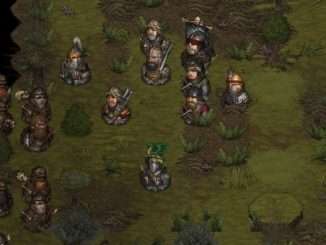
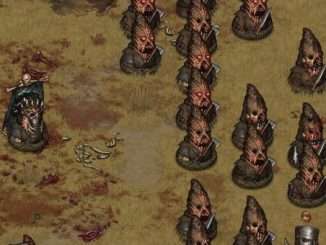
Be the first to comment